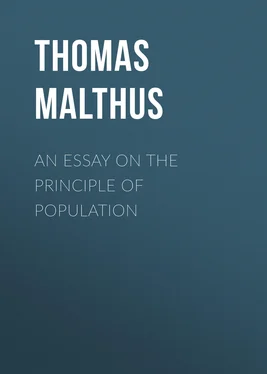Thomas Malthus - An Essay on the Principle of Population
Здесь есть возможность читать онлайн «Thomas Malthus - An Essay on the Principle of Population» — ознакомительный отрывок электронной книги совершенно бесплатно, а после прочтения отрывка купить полную версию. В некоторых случаях можно слушать аудио, скачать через торрент в формате fb2 и присутствует краткое содержание. Жанр: foreign_edu, sociology_book, на английском языке. Описание произведения, (предисловие) а так же отзывы посетителей доступны на портале библиотеки ЛибКат.
- Название:An Essay on the Principle of Population
- Автор:
- Жанр:
- Год:неизвестен
- ISBN:нет данных
- Рейтинг книги:3 / 5. Голосов: 1
-
Избранное:Добавить в избранное
- Отзывы:
-
Ваша оценка:
- 60
- 1
- 2
- 3
- 4
- 5
An Essay on the Principle of Population: краткое содержание, описание и аннотация
Предлагаем к чтению аннотацию, описание, краткое содержание или предисловие (зависит от того, что написал сам автор книги «An Essay on the Principle of Population»). Если вы не нашли необходимую информацию о книге — напишите в комментариях, мы постараемся отыскать её.
An Essay on the Principle of Population — читать онлайн ознакомительный отрывок
Ниже представлен текст книги, разбитый по страницам. Система сохранения места последней прочитанной страницы, позволяет с удобством читать онлайн бесплатно книгу «An Essay on the Principle of Population», без необходимости каждый раз заново искать на чём Вы остановились. Поставьте закладку, и сможете в любой момент перейти на страницу, на которой закончили чтение.
Интервал:
Закладка:
These considerations are calculated to prevent, and certainly do prevent, a very great number in all civilized nations from pursuing the dictate of nature in an early attachment to one woman. And this restraint almost necessarily, though not absolutely so, produces vice. Yet in all societies, even those that are most vicious, the tendency to a virtuous attachment is so strong that there is a constant effort towards an increase of population. This constant effort as constantly tends to subject the lower classes of the society to distress and to prevent any great permanent amelioration of their condition.
The way in which, these effects are produced seems to be this. We will suppose the means of subsistence in any country just equal to the easy support of its inhabitants. The constant effort towards population, which is found to act even in the most vicious societies, increases the number of people before the means of subsistence are increased. The food therefore which before supported seven millions must now be divided among seven millions and a half or eight millions. The poor consequently must live much worse, and many of them be reduced to severe distress. The number of labourers also being above the proportion of the work in the market, the price of labour must tend toward a decrease, while the price of provisions would at the same time tend to rise. The labourer therefore must work harder to earn the same as he did before. During this season of distress, the discouragements to marriage, and the difficulty of rearing a family are so great that population is at a stand. In the mean time the cheapness of labour, the plenty of labourers, and the necessity of an increased industry amongst them, encourage cultivators to employ more labour upon their land, to turn up fresh soil, and to manure and improve more completely what is already in tillage, till ultimately the means of subsistence become in the same proportion to the population as at the period from which we set out. The situation of the labourer being then again tolerably comfortable, the restraints to population are in some degree loosened, and the same retrograde and progressive movements with respect to happiness are repeated.
This sort of oscillation will not be remarked by superficial observers, and it may be difficult even for the most penetrating mind to calculate its periods. Yet that in all old states some such vibration does exist, though from various transverse causes, in a much less marked, and in a much more irregular manner than I have described it, no reflecting man who considers the subject deeply can well doubt.
Many reasons occur why this oscillation has been less obvious, and less decidedly confirmed by experience, than might naturally be expected.
One principal reason is that the histories of mankind that we possess are histories only of the higher classes. We have but few accounts that can be depended upon of the manners and customs of that part of mankind where these retrograde and progressive movements chiefly take place. A satisfactory history of this kind, on one people, and of one period, would require the constant and minute attention of an observing mind during a long life. Some of the objects of inquiry would be, in what proportion to the number of adults was the number of marriages, to what extent vicious customs prevailed in consequence of the restraints upon matrimony, what was the comparative mortality among the children of the most distressed part of the community and those who lived rather more at their ease, what were the variations in the real price of labour, and what were the observable differences in the state of the lower classes of society with respect to ease and happiness, at different times during a certain period.
Such a history would tend greatly to elucidate the manner in which the constant check upon population acts and would probably prove the existence of the retrograde and progressive movements that have been mentioned, though the times of their vibrations must necessarily be rendered irregular from the operation of many interrupting causes, such as the introduction or failure of certain manufactures, a greater or less prevalent spirit of agricultural enterprise, years of plenty, or years of scarcity, wars and pestilence, poor laws, the invention of processes for shortening labour without the proportional extension of the market for the commodity, and, particularly, the difference between the nominal and real price of labour, a circumstance which has perhaps more than any other contributed to conceal this oscillation from common view.
It very rarely happens that the nominal price of labour universally falls, but we well know that it frequently remains the same, while the nominal price of provisions has been gradually increasing. This is, in effect, a real fall in the price of labour, and during this period the condition of the lower orders of the community must gradually grow worse and worse. But the farmers and capitalists are growing rich from the real cheapness of labour. Their increased capitals enable them to employ a greater number of men. Work therefore may be plentiful, and the price of labour would consequently rise. But the want of freedom in the market of labour, which occurs more or less in all communities, either from parish laws, or the more general cause of the facility of combination among the rich, and its difficulty among the poor, operates to prevent the price of labour from rising at the natural period, and keeps it down some time longer; perhaps till a year of scarcity, when the clamour is too loud and the necessity too apparent to be resisted.
The true cause of the advance in the price of labour is thus concealed, and the rich affect to grant it as an act of compassion and favour to the poor, in consideration of a year of scarcity, and, when plenty returns, indulge themselves in the most unreasonable of all complaints, that the price does not again fall, when a little rejection would shew them that it must have risen long before but from an unjust conspiracy of their own.
But though the rich by unfair combinations contribute frequently to prolong a season of distress among the poor, yet no possible form of society could prevent the almost constant action of misery upon a great part of mankind, if in a state of inequality, and upon all, if all were equal.
The theory on which the truth of this position depends appears to me so extremely clear that I feel at a loss to conjecture what part of it can be denied.
That population cannot increase without the means of subsistence is a proposition so evident that it needs no illustration.
That population does invariably increase where there are the means of subsistence, the history of every people that have ever existed will abundantly prove.
And that the superior power of population cannot be checked without producing misery or vice, the ample portion of these too bitter ingredients in the cup of human life and the continuance of the physical causes that seem to have produced them bear too convincing a testimony.
But, in order more fully to ascertain the validity of these three propositions, let us examine the different states in which mankind have been known to exist. Even a cursory review will, I think, be sufficient to convince us that these propositions are incontrovertible truths.
CHAPTER 3
The savage or hunter state shortly reviewed—The shepherd state, or the tribes of barbarians that overran the Roman Empire—The superiority of the power of population to the means of subsistence—the cause of the great tide of Northern Emigration.
In the rudest state of mankind, in which hunting is the principal occupation, and the only mode of acquiring food; the means of subsistence being scattered over a large extent of territory, the comparative population must necessarily be thin. It is said that the passion between the sexes is less ardent among the North American Indians, than among any other race of men. Yet, notwithstanding this apathy, the effort towards population, even in this people, seems to be always greater than the means to support it. This appears, from the comparatively rapid population that takes place, whenever any of the tribes happen to settle in some fertile spot, and to draw nourishment from more fruitful sources than that of hunting; and it has been frequently remarked that when an Indian family has taken up its abode near any European settlement, and adopted a more easy and civilized mode of life, that one woman has reared five, or six, or more children; though in the savage state it rarely happens that above one or two in a family grow up to maturity. The same observation has been made with regard to the Hottentots near the Cape. These facts prove the superior power of population to the means of subsistence in nations of hunters, and that this power always shews itself the moment it is left to act with freedom.
Читать дальшеИнтервал:
Закладка:
Похожие книги на «An Essay on the Principle of Population»
Представляем Вашему вниманию похожие книги на «An Essay on the Principle of Population» списком для выбора. Мы отобрали схожую по названию и смыслу литературу в надежде предоставить читателям больше вариантов отыскать новые, интересные, ещё непрочитанные произведения.
Обсуждение, отзывы о книге «An Essay on the Principle of Population» и просто собственные мнения читателей. Оставьте ваши комментарии, напишите, что Вы думаете о произведении, его смысле или главных героях. Укажите что конкретно понравилось, а что нет, и почему Вы так считаете.












